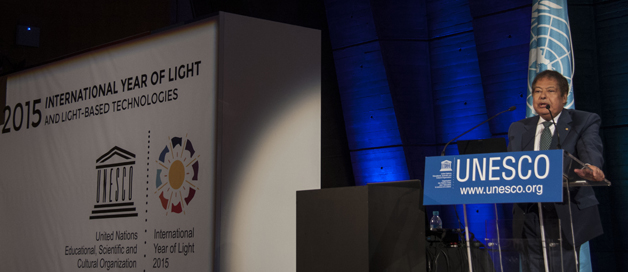Investing in education & science is vital in the Arab world - Interview with Ahmed Zewail
Paris, 19 January 2015 – On Day 1 of our International Year of Light event at UNESCO Headquarters, we caught up with Ahmed Zewail, the Egyptian-American scientist who won the Nobel Prize in Chemistry in 1999 for his pioneering work in femtoscience.
You are known as a pioneer in the field of femtochemistry. How can femtochemistry stimulate the development of light-based technologies today? Are there practical applications that could help improve our quality of life, worldwide?
The whole field of femto-science is dependent on the interface between femtosecond lasers and the interaction with materials, so as regards technology, it developed the whole spectrum of femtosecond laser. One part is the technology, the other part, of course, is science itself – this is the first time we could study atoms and molecules in motion. They are moving and you want to know: “How do they love and hate each other?” The sciences have very wide ranges of applications.
You are the only Arab to ever win a Nobel Prize for Science. How can we encourage the pursuit of science today - especially among youth - in the Arab World?
To be honest, I am very sad that I am the only person living to have the Prize - not only in the Arab world, but in the entire Muslim world of more than one billion. That doesn’t make any sense when you know what Arabs and Muslims have accomplished thousands of years ago - you feel sad about it. I always said that if the Nobel Prize was given when the Alexandria Library was at its peak two thousand years ago, Egypt would have probably gotten most of the Prizes. I think you can remedy this situation by investing more in education and in science, and that is what we should be doing in our part of the world. And that is what I am trying very hard to push in the Arab-Muslim world.
What do you hope will be accomplished for the International Year of Light 2015?
It’s the awareness more than anything else. I think that people are living as a result of the value of science but they don’t know it. Having something like the “year of light” makes them aware of how wonderful and powerful science is in our life.
1000 years after the publication of “book of optics” by Ibn al Haytham, what is the influence of this scientist and his publication ?
What’s most important is that we are all built on what others have done before us. If it weren’t for Ibn al Haytham, Descartes, Newton, Bacon and others, the world would not have seen what Ibn al Haytham has done. I am hoping now that the Arab and Muslim world will benefit from the achievements that have taken place in the Western world and develop them, just like the Chinese and South Koreans are doing now, so we can also benefit and be part of the world.
Related links:
- More information
- Official IYL2015 website
- Facebook: IYLight2015
- Twitter: @IYL2015

Nobel Prize winner Ahmed Zewail gives a lecture on “Light and Life” during the opening of the International Year of Light 2015. © UNESCO/Nora Houguenade
<- Back to: All news




